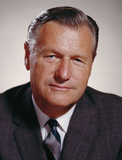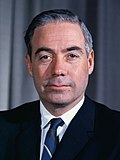
A | B | C | D | E | F | G | H | CH | I | J | K | L | M | N | O | P | Q | R | S | T | U | V | W | X | Y | Z | 0 | 1 | 2 | 3 | 4 | 5 | 6 | 7 | 8 | 9
| |||||||||||||||||||||||||||||||||||||||||
1,308 delegates to the 1964 Republican National Convention 655 votes needed to win | |||||||||||||||||||||||||||||||||||||||||
|---|---|---|---|---|---|---|---|---|---|---|---|---|---|---|---|---|---|---|---|---|---|---|---|---|---|---|---|---|---|---|---|---|---|---|---|---|---|---|---|---|---|
| |||||||||||||||||||||||||||||||||||||||||
| |||||||||||||||||||||||||||||||||||||||||
From March 10 to June 2, 1964, voters of the Republican Party elected 1,308 delegates to the 1964 Republican National Convention through a series of delegate selection primaries and caucuses, for the purpose of determining the party's nominee for president in the 1964 United States presidential election.
United States Senator Barry Goldwater of Arizona was selected as the nominee at the 1964 Republican National Convention held from July 13 to July 16, 1964, in San Francisco, California.[1]
Background
1952 nomination
In 1952, Senator Robert A. Taft, a leading conservative, lost the nomination to Supreme Allied Commander Dwight D. Eisenhower. Eisenhower's candidacy was generated by a draft by the so-called "Eastern Establishment," led by Thomas E. Dewey and Henry Cabot Lodge Jr. The nomination was narrowly secured when Dewey and Lodge out-maneuvered Taft in pre-convention fights over delegate credentials. Eisenhower won the general election and was re-elected in 1956. The bitter 1952 convention, the presumption that Taft was too extreme to win the general election, and Eisenhower's re-election meant that conservative Republicans had not occupied the White House since at least 1929 or won the Republican nomination since at least 1936. The memory of 1952, the last contested Republican nomination, remained fresh in the minds of all parties as the 1964 primaries approached.
1960 election
In 1960, the nomination was easily secured for Vice President Richard Nixon. Nixon, who had made his name as an anti-communist Representative and Senator from California, was acceptable to all branches of the party. His only serious challenge came from Nelson Rockefeller, the free-spending Governor of New York and heir to the Rockefeller family fortune and Dewey's position as leader of the moderate party establishment. Though Rockefeller could not take the nomination himself, he could potentially marshal delegates to deny Nixon the nomination at the convention. On July 22, Nixon met Rockefeller at the latter's Fifth Avenue penthouse. After four hours of negotiations, they reached an agreement for fourteen points in the party platform, generally committing Nixon to greater spending on defense and education, opposition to racial segregation, and a flexible internationalist foreign policy. The so-called Compact of Fifth Avenue was reviled by conservatives,[2] who unsuccessfully attempted to draft Senator Barry Goldwater of Arizona, an occasional Eisenhower critic, as Nixon's running mate; at the convention, however, Goldwater declined to run.[3]
Nixon narrowly lost the election to Senator John F. Kennedy of Massachusetts. Kennedy, the first Roman Catholic elected president and a supporter of federal enforcement of equal civil rights for African Americans, performed relatively poorly in the South. While the region had been a Democratic stronghold since the end of Reconstruction, Kennedy's only convincing majority was in the state of Georgia. He lost Tennessee and Florida to Nixon and only narrowly won North Carolina, South Carolina, and Texas. In four more states, Arkansas, Alabama, Mississippi, and Louisiana, dissident members of his own party fielded independent slates of electors which refused to pledge their votes to Kennedy.[b] Thus, despite Nixon's loss, the Republican Party entered the Kennedy administration with hopes of finding support in the South.
Draft Goldwater Committee
The earliest movements toward the 1964 nomination were made on behalf of Senator Barry Goldwater of Arizona, against his express wishes, by a group composed mostly of Young Republicans and led by F. Clifton White, a longtime party activist from upstate New York. At a secret meeting in Chicago on October 8, 1961, White proposed that, partly thanks to the reallocation of delegates toward the conservative South and Midwest, a candidate could secure the nomination without the support of New York or New England. The group agreed to organize throughout the country and began fundraising.
In spring 1962, they leased a Manhattan office in the Chanin Building. Their address, Suite 3505, became the informal name of their campaign. Goldwater had a personal audience with White in January 1963 and urged him to drop the draft effort. Instead, the group went public as the "Draft Goldwater Committee." Headquarters were informally opened in critical states by mid-1963, and by the summer he led some opinion polls among Republicans. The New York Times reported on July 7 that a movement was underfoot in the northeast for "favorite sons" to run in state primaries to prevent a Goldwater nomination, since they feared major losses with Goldwater.
Nelson Rockefeller marriage
Though conservatives organized behind the unwilling Goldwater, the leading candidate for the nomination in early 1963 was Nelson Rockefeller. Rockefeller began to campaign around the country and was well received in on a spring tour of the Midwest, though he stopped Goodwin Knight from formally establishing a California campaign office. He led most polling over Goldwater through the spring.
However, Rockefeller's popularity plummeted when he remarried on May 4. Rockefeller had been divorced from Mary Todhunter Clark for about one year. His new wife, Margaretta Large "Happy" Filter, was eighteen years his junior, had worked as a member of his office staff, and had been married to Rockefeller's close friend, with four children, just one month prior. They left for a honeymoon in Venezuela and the Virgin Islands.[4]
The marriage was instantly the subject of scrutiny and criticism from the press, fellow Republicans, and even the United Presbyterian Church.[c] Senator Prescott Bush of Connecticut, speaking at a prep school graduation, asked, "Have we come to the point in our life as a nation where the governor of a great state can desert a good wife, mother of his grown children, divorce her, then persuade a mother of youngsters to abandon her husband and their four children and marry the governor?"[4] When the newlyweds attended the convention of the National Federation of Republican Women convention later that year (by then a loyal Goldwater organization), they were received with silence, and several women staged a walk-out.[4] Others publicly criticizing the marriage included Reinhold Niebuhr and Nikita Khrushchev.[4]
In Gallup polling, Rockefeller lost a seventeen-point lead in polling and trailed Goldwater by five points.[4] Any conservative support was gone, as was much of his moderate base. The Republican Citizens Committee, a caucus of moderate Republicans, decided by July 16 not to support Rockefeller. Rockefeller plowed ahead with a New Hampshire campaign; on September 16, he announced that former Governor Hugh Gregg would lead his campaign. Rockefeller began campaigning in New Hampshire in October 1963 and formally entered the race on November 7.
Kennedy assassination
On November 22, 1963, President John F. Kennedy was assassinated in Dallas.
The Kennedy assassination rocked the Republican primary. Rockefeller, the only candidate actively in the race, paused his campaign for a month of mourning. Those candidates not already running declined to openly seek the nomination, either out of principle or fear of a career-ending loss. Newly inaugurated President Lyndon B. Johnson enjoyed a major groundswell of sympathy and support, leading all contenders by a large margin.
On December 7, Dwight Eisenhower called on Henry Cabot Lodge Jr. to enter the race as a compromise candidate.
Goldwater formally entered the race on January 3.






